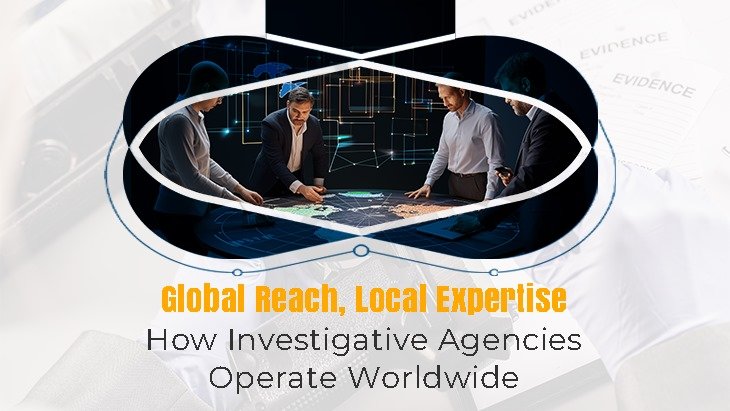The role of investigative agencies has grown exponentially in an increasingly interconnected world. From transnational crimes to corporate investigations, these organisations navigate complex global landscapes while leveraging local expertise to achieve their objectives. The dual approach of global reach combined with local insight is key to their success in addressing various challenges. Here, we delve into how investigative agencies operate worldwide, highlighting their strategies, tools, and collaboration methods.
The Necessity of Global Investigative Efforts
Globalisation has brought people, economies, and cultures closer together. While this interconnectedness has fostered economic growth and cultural exchange, it has also given rise to sophisticated criminal activities that cross borders. Cybercrime, human trafficking, money laundering, terrorism, and corporate fraud are just a few examples of challenges that require coordinated international responses.
Private detectivesface a different legal framework, cultural nuances, and technological advancement. Working in a global environment requires an understanding of different jurisdictions and the ability to navigate complex bureaucratic systems. Agencies with global reach and local expertise are better placed to address these issues.
Leveraging Global Networks
Investigative agencies can work beyond borders. In most cases, transnational crimes are dealt with through the collaboration of agencies such as INTERPOL, Europol, and the FBI. These organisations maintain databases, share intelligence, and support local law enforcement agencies. Thus, they can tackle issues that would be impossible for a single agency to handle alone.
For example, INTERPOL’s secure global police communications system is I-24/7, which links law enforcement agencies in 195 countries. In real time, this system shares criminal data, including fingerprints, DNA profiles, and stolen property records. Such equipment ensures swift action against international criminals and that information finds the right hands immediately.
Global networks also serve corporate investigations. Private investigation firms usually have offices in various countries or partner with local agencies to collect information. This is more important in cases where the company is multinational and its business practices vary in different regions and regulatory environments.
Local Expertise Importance
While global networks provide the necessary reach, local expertise ensures effectiveness on the ground. Local investigators are invaluable assets, as they bring an intimate understanding of cultural norms, language, and regional legal systems. These insights are critical when conducting interviews, gathering evidence, or navigating local bureaucracy.
For instance, fraud investigations will always require some information that a person who is locally based might obtain, but not the outsider. This is especially important in cybercrime, where local specialists can better understand region-specific threats or trends. Hiring local talent or even teaming up with local agencies will, therefore, ensure no cultural and logistical barriers to global efforts at investigation.
Role of Technology
Technology is the backbone of the operations of the investigation agency. Advanced tools allow investigators to collect, analyse, and share data more efficiently. Some of the key technological advancements include:
- Big Data Analytics: Investigators use big data to identify patterns and trends that may indicate criminal activity. Analysing financial transactions, for example, can reveal money laundering schemes or fraudulent activities.
- Artificial Intelligence: AI-based tools are supposed to help decode enormous amounts of data promptly. These include facial recognition, predictive policing, and threat assessment.
- Debugging and Sweeping: With the rise of cybercrimes, agencies are highly advanced in utilising cybersecurity as their tools for tracing hackers, preventing data breaches, and protecting confidential information.
- Drones and Surveillance: Drones and high-end surveillance devices allow the discreet tracking of suspects or locations where presence might be difficult.
- Blockchain Analysis: With cryptocurrencies now a preferred medium for illicit transactions, blockchain analysis tools help investigators trace and track suspicious activities.
Combining these technologies with human expertise helps investigative agencies enhance their efficiency in solving complex cases.
Collaboration Across Borders
- International cooperation is essential for the success of global investigations. Agencies often must coordinate with foreign governments, law enforcement bodies, and international organisations to achieve their objectives. Mutual legal assistance treaties (MLATs) and extradition agreements play a significant role in facilitating such cooperation.
- Joint task forces are another effective strategy. For instance, the Joint Cybercrime Action Taskforce (J-CAT) operates under Europol and brings together cybercrime specialists from multiple countries. By sharing intelligence and resources, these task forces address threats that transcend borders.
- Private-public partnerships play a significant role. Private enterprises, especially those in the financial and ICT sectors, normally collaborate with detectives to curb fraud and cybercrimes, among other crimes. This partnership reaps both fruits, bringing together the might of authority in the public sector and private sector innovation.
Ethical and Legal Challenges
Operating globally raises ethical and legal dilemmas. Different legal systems and privacy laws complicate investigations. For instance, data protection regulations, such as the General Data Protection Regulation in Europe, have very strict limitations on collecting and using data. Investigators must navigate these complexities while ensuring compliance with local laws.
Ethical considerations are also paramount. Surveillance, interrogation, and undercover operations must be conducted responsibly to ensure that individuals’ rights are not violated. Agencies must balance effective investigations with ethical boundaries.
See this also: Top 5 Detective agencies in the World
Conclusion
Effective investigation operations require a perfect amalgamation of global reach and local expertise. With access to international networks, advanced technology, and the use of local knowledge, agencies can understand the intricacies of modern crimes and respond to their challenges. Therefore, collaboration, adaptability, and ethical practice will define further success in a shifting global landscape.



